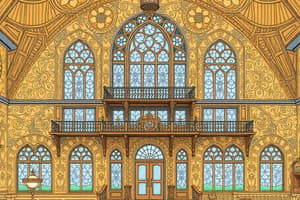Podcast
Questions and Answers
What construction material is known for its flexibility and strength, making it a preferred choice for heavy loads and tall structures such as skyscrapers?
What construction material is known for its flexibility and strength, making it a preferred choice for heavy loads and tall structures such as skyscrapers?
- Wood
- Masonry
- Steel (correct)
- Concrete
Which construction material is commonly used in foundational structures like columns and slabs due to its high compressive strength and affordability?
Which construction material is commonly used in foundational structures like columns and slabs due to its high compressive strength and affordability?
- Concrete (correct)
- Masonry
- Wood
- Steel
In modern architecture, which material is often chosen for its transparency, allowing natural light into buildings while maintaining strength and durability?
In modern architecture, which material is often chosen for its transparency, allowing natural light into buildings while maintaining strength and durability?
- Glass (correct)
- Steel
- Concrete
- Masonry
Which construction material provides natural insulation and is considered a renewable resource for sustainable construction practices?
Which construction material provides natural insulation and is considered a renewable resource for sustainable construction practices?
What type of building materials have been historically used and are still popular choices today for low-rise buildings?
What type of building materials have been historically used and are still popular choices today for low-rise buildings?
Which construction material plays a critical role in providing shelter, protection, and various functions in everyday life?
Which construction material plays a critical role in providing shelter, protection, and various functions in everyday life?
What is the primary purpose of building codes?
What is the primary purpose of building codes?
Which of the following is NOT typically regulated by building codes in North America?
Which of the following is NOT typically regulated by building codes in North America?
Why have building codes evolved over time?
Why have building codes evolved over time?
During which stage of construction are inspections carried out to verify compliance with building codes?
During which stage of construction are inspections carried out to verify compliance with building codes?
What role do architects and engineers play in the process of constructing a building?
What role do architects and engineers play in the process of constructing a building?
Which step in the construction process involves contractors building the structure according to approved plans?
Which step in the construction process involves contractors building the structure according to approved plans?
Flashcards are hidden until you start studying
Study Notes
Buildings: Understanding Construction Materials, Building Codes, and Processes
Introduction
Buildings play a critical role in our daily lives, providing shelter, protection, and a variety of functions such as offices, schools, and community spaces. Understanding the key components of buildings, including construction materials, building codes, and processes, is essential for ensuring their safety, durability, and sustainability. This article explores these aspects in detail.
Construction Materials
Construction materials are the foundation of any building. They determine its strength, longevity, and resistance to various environmental factors. Some common construction materials include:
- Concrete: A widely used material due to its high compressive strength and affordability, concrete is often used in foundational structures like columns and slabs.
- Masonry: Masonry materials like bricks and stones have been used historically and continue to be popular choices today, particularly for low-rise buildings.
- Steel: Known for its flexibility and strength, steel is a preferred choice for heavy loads and tall structures, such as skyscrapers.
- Wood: Used for both structural and decorative purposes, wood offers natural insulation and is a renewable resource for sustainable construction.
- Glass: A popular choice in modern architecture, glass provides transparency and allows natural light to penetrate buildings while offering strength and durability.
Building Codes
Building codes are a set of regulations that govern the design, construction, maintenance, and alteration of buildings. They aim to ensure public safety by establishing minimum standards for various aspects of construction. In North America, building codes include regulations on materials, fire resistance, ventilation, means of egress, and electrical systems.
Enforcement and Adoption
Building codes are enforced through inspections conducted at different stages of construction. These inspections verify compliance with the code requirements. The adoption and enforcement of building codes can vary between jurisdictions but generally involve collaboration among architects, engineers, contractors, and local authorities.
Evolution and Development
Building codes have evolved over time, driven by advancements in technology, research, and response to disasters. For example, after the devastating earthquake in Mexico City in 1985 caused extensive damage due to poor quality construction, new building codes were implemented to improve safety measures. Today, model codes like the International Building Code (IBC) are widely adopted across the United States, providing a standardized framework for safe building practices.
Processes in Construction
The process of constructing a building involves several steps from planning to completion:
- Design: Architects and engineers develop plans detailing the structure's layout, materials, and specifications.
- Permitting: Local authorities issue permits based on the building plan and zoning laws.
- Construction: Contractors follow the approved plan to build the structure using selected materials and techniques.
- Inspection: At various stages of construction, inspectors check for adherence to codes and standards.
- Completion: Once all regulatory requirements are met, the building is completed and handed over to the owner.
By understanding these key components - construction materials, building codes, and processes - we can appreciate the intricate workings behind what makes our structures safe, efficient, and aesthetically pleasing.
Studying That Suits You
Use AI to generate personalized quizzes and flashcards to suit your learning preferences.




